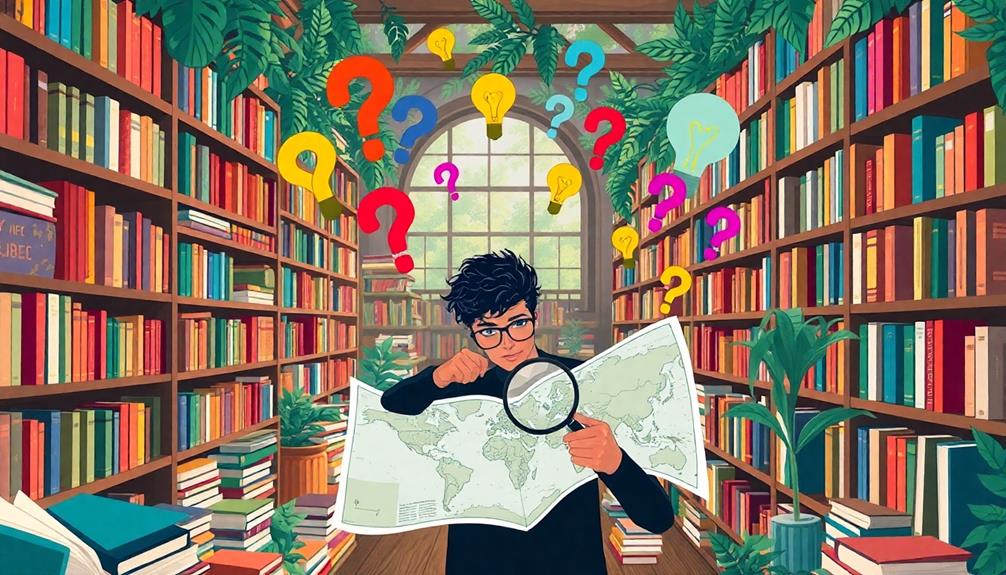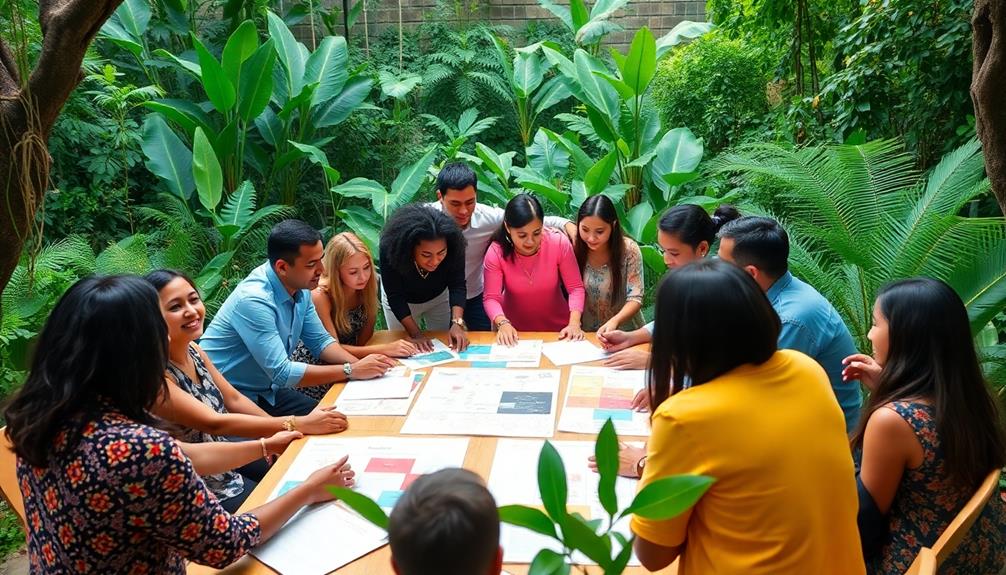To develop a curious mindset for better decision-making, start by asking open-ended questions. Challenge yourself to explore different perspectives and alternatives. Foster an environment of inquiry within your team; this encourages everyone to share ideas and insights freely. Embrace lifelong learning to continually sharpen your critical thinking and problem-solving skills. Don't shy away from challenges; instead, view them as opportunities for growth. Regularly reflect on your decision-making processes to identify improvements. By nurturing curiosity, you'll enhance your ability to make informed choices and innovate effectively. There's much more to discover that can further enhance your decision-making skills.
Key Takeaways
- Embrace exploratory questions to challenge assumptions and deepen understanding in decision-making processes.
- Foster a culture of inquiry within teams to encourage open dialogue and collaborative exploration of ideas.
- Regularly engage in "Why" meetings to stimulate critical thinking and alternative solutions among team members.
- Normalize diverse perspectives through brainstorming sessions to enhance creativity and innovative problem-solving.
- Commit to continuous learning to refine decision-making skills and adapt to changing circumstances effectively.
Understanding Curiosity

Curiosity has always been a driving force behind human progress, and understanding it's essential for growth. It's that intrinsic motivation that propels you to explore, learn, and engage with new ideas.
When you embrace curiosity, you naturally start to ask questions, seeking deeper understanding rather than settling for the surface. This mindset is fundamental for making informed decisions, as it encourages you to contemplate various perspectives and gather more information before concluding. Engaging in top wellness tips can also enhance your overall mental clarity, making it easier to foster a curious mindset.
In workplaces that cultivate curiosity, you'll notice a significant boost in employee engagement. Yet, research shows that only 24% of employees currently feel curious at work. By recognizing the importance of curiosity, you can combat complacency and drive innovation in your personal and professional life.
It's not just about knowing; it's about continuously questioning and exploring better methods and efficiencies.
Moreover, your Curiosity Quotient (CQ) plays an essential role in effective leadership alongside emotional and intelligence quotients. By nurturing your curiosity, you equip yourself to learn and grow, revealing new pathways for success and creativity.
Embrace this driving force, and watch how it transforms your approach to challenges and opportunities.
Benefits of a Curious Mindset

A curious mindset sharpens your problem-solving skills by encouraging you to explore various angles and solutions.
By fostering an environment of lifelong learning linked to improved cognitive function, you can enhance your ability to think critically and creatively.
When you embrace curiosity, you're more likely to spark innovative ideas that can transform challenges into opportunities.
This approach not only benefits you personally but also enhances collaboration and creativity within your team.
Enhances Problem-Solving Skills
Embracing a curious mindset opens the door to enhanced problem-solving skills. When you cultivate curiosity, you naturally start asking probing questions that lead to a deeper understanding of the problems you face. This approach not only enhances your ability to identify effective solutions but also boosts your problem-solving effectiveness by up to 20%.
As you explore various options and outcomes, you become more adept at considering diverse perspectives, which helps reduce blind spots and improves the quality of your decisions. By fostering an abundance mindset, you can further enrich your problem-solving process and discover innovative solutions that align with your goals.
Curiosity promotes continuous learning, allowing you to reflect on what works and what doesn't. This iterative process enables you to refine your problem-solving strategies over time.
Organizations that foster this culture of curiosity often see a remarkable 30% increase in innovative solutions to complex challenges, showcasing the direct impact of curiosity on effective problem-solving skills.
Fosters Innovative Solutions
With a curious mindset, you reveal the potential for innovative solutions that can transform challenges into opportunities. Embracing curiosity allows you to explore new avenues and question the status quo, leading to significant breakthroughs.
By fostering this mindset, you can achieve remarkable benefits:
- Identify Gaps: Actively questioning existing processes helps you pinpoint areas for improvement, resulting in a 30% increase in project efficiency.
- Enhance Creativity: Curiosity drives creative problem-solving, enabling you to evaluate diverse perspectives and reducing costly errors by 50%.
- Boost Idea Generation: Engaging in exploratory thinking can lead teams to generate 60% more ideas during brainstorming sessions, fostering a culture of innovation.
Organizations that prioritize curiosity report 20% higher innovation rates and a 35% increase in employee engagement, which directly correlates to productivity.
So, by developing a curious mindset, you not only contribute to your personal growth but also play an essential role in driving innovative solutions within your team or organization.
Embrace curiosity, and watch how it transforms your approach to decision-making and problem-solving.
The Decision-Making Process

Effective decision-making is essential for achieving success in both personal and professional domains. The decision-making process involves systematically gathering information, evaluating options, and reviewing outcomes to select the best possible course of action. By asking questions and analyzing different scenarios, you can enhance your understanding and make informed choices.
To streamline your decision-making, consider the following framework:
| Step | Description |
|---|---|
| Gather Information | Collect relevant data and insights. |
| Evaluate Options | Assess alternatives against your goals. |
| Review Outcomes | Analyze results to learn and adapt. |
A long-term focus is vital; consider both immediate and future implications to enhance the sustainability of your choices. This systematic analysis not only aids in making informed decisions but also improves risk management by mitigating potential setbacks. Remember, good decision-making is closely linked to project and career advancements, as wise choices propel you toward success. Embracing this structured approach will make you a more effective decision-maker, ultimately aligning your actions with your personal or organizational objectives and values.
Enhancing Decision-Making With Curiosity

Curiosity plays a pivotal role in refining your decision-making skills. When you approach problems with a curious mindset, you naturally gather diverse perspectives and explore multiple options. This not only leads to better conclusions but also fosters innovative solutions.
By embracing curiosity, you can enhance your decision-making process through specific actions:
- Ask Exploratory Questions: Challenge assumptions and dig deeper into the reasoning behind choices. This helps you uncover hidden insights and alternative viewpoints.
- Engage in Reflective Practices: Regularly assess the outcomes of your decisions. Reflecting on what worked and what didn't strengthens your curiosity and sharpens future choices.
- Cultivate a Questioning Culture: Whether in a team or individually, encourage asking questions. Organizations that foster curiosity see improved performance, as team members feel empowered to explore new ideas.
Ultimately, curiosity-driven decision-making helps mitigate risks associated with hasty conclusions. By actively seeking knowledge and insights, you can guarantee that your choices are informed and effective, paving the way for continuous improvement in your decision-making journey.
Strategies to Cultivate Curiosity

To cultivate curiosity, you can start by embracing explorative questions that push your thinking.
Incorporating diverse perspectives into your conversations will enrich your understanding and spark innovative ideas.
Embrace Explorative Questions
Releasing the potential of explorative questions can transform your approach to problem-solving and innovation. When you cultivate curiosity through questions like "Why?", "What if?", and "How might we?", you pave the way for deeper insights and creative solutions.
Here's how you can embrace these explorative questions effectively:
- Engage in "Why" Meetings: Regularly hold sessions where team members can challenge established processes. This encourages exploration of alternative solutions and enhances decision-making quality.
- Create Feedback Loops: Analyze the outcomes of your inquiries. This helps you refine your questioning skills over time and learn from your experiences.
- Foster a Curious Environment: Cultivate a culture where curiosity is valued. Research shows organizations supporting curiosity lead to better team performance, boosting engagement and innovation.
Foster Diverse Perspectives
Building on the power of explorative questions, fostering diverse perspectives can greatly enhance your curiosity and innovation. When you encourage team members to share their viewpoints, you create richer discussions and more innovative solutions.
Diverse perspectives can boost problem-solving effectiveness by up to 60%. By actively seeking input from individuals with varied backgrounds, you cultivate a culture that values curiosity and reduces the barriers to asking questions—barriers that 70% of employees often face.
Implementing regular brainstorming sessions that prioritize diverse ideas can spark creative thinking, as teams with varied perspectives are 35% more likely to outperform their peers. You can also utilize tools like anonymous feedback mechanisms to promote honest sharing of opinions, fostering an inclusive environment where curiosity thrives.
Consider creating cross-functional teams that encourage collaboration across departments. This strategy can lead to a 20% increase in innovative outputs, as team members challenge each other's assumptions and broaden their understanding.
Normalize Curiosity in Teams
Curiosity isn't just a trait; it's an essential ingredient for team success. When you normalize curiosity within your team, you create an environment where innovative ideas can flourish.
Here are three strategies to cultivate this mindset:
- Hold regular "Why" meetings: These sessions encourage team members to question established processes and explore new possibilities. Curiosity provides a platform for innovative thinking and enhances engagement.
- Implement "What if…?" and "How might we…?" days: These initiatives promote exploration and creativity. Encourage your team to stay curious about various approaches, which can lead to actionable insights.
- Create an open feedback environment: Foster a culture where everyone feels safe to share ideas and ask questions. This openness boosts overall team performance and effective decision-making.
Overcoming Barriers to Curiosity

In today's fast-paced workplace, many people find their natural curiosity stifled by societal pressures and rigid educational systems. Overcoming barriers to curiosity is essential for fostering innovation and engagement.
A survey reveals that 70% of employees struggle to ask questions, often fearing disagreement or the possibility of slowing down decision-making. To cultivate a more open environment, you can encourage a culture that celebrates inquiry. Implement initiatives like "Why? What if…? and How might we…?" days to inspire your team to seek out new ideas and perspectives.
Reflecting on past experiences can also highlight the value of curiosity in both personal and professional growth. By understanding how curiosity has helped you succeed, you're more likely to push past self-imposed limitations.
Additionally, develop a habit of asking exploratory questions during daily interactions. This practice not only enhances your decision-making capabilities but also encourages others to engage in the process.
Lifelong Learning and Adaptability

Embracing lifelong learning not only enriches your skill set but also enhances your ability to adapt in an ever-changing world.
By continuously acquiring new knowledge and skills, you become more equipped to handle the rapid changes that life throws your way. This adaptability is essential for personal and professional success.
Here are three key benefits of lifelong learning that foster adaptability:
- Enhanced Problem-Solving: Engaging in continuous education sharpens your critical thinking skills, enabling you to navigate challenges effectively.
- Career Advancement: Research shows that individuals who prioritize lifelong learning often experience greater career opportunities and personal fulfillment due to their enriched skill sets.
- Resilience Building: Combining lifelong learning with a growth mindset allows you to embrace challenges and view setbacks as opportunities for improvement.
Community and Collaboration

Building on the foundation of lifelong learning, community and collaboration play essential roles in nurturing a curious mindset. When you engage in community discussions and collaborative projects, you foster a culture of curiosity that leads to innovative solutions and improved decision-making processes.
Research shows that organizations emphasizing collaboration see a 20% increase in employee engagement, which directly correlates with heightened curiosity and creativity.
By actively involving team members in brainstorming sessions, you encourage diverse perspectives that enhance critical thinking and decision-making outcomes. Regularly scheduled "curiosity meetings" where you and your colleagues share insights and ask questions can greatly improve team dynamics, leading to better-informed decisions.
These meetings create an atmosphere where curiosity thrives, allowing everyone to contribute.
Collaboration across different departments is equally crucial; it enables the sharing of knowledge and ideas, sparking curiosity and driving collective problem-solving efforts.
When you create a strong community rooted in collaboration, you not only support your own curiosity but also inspire those around you to explore new ideas and solutions.
Embrace these practices, and watch your decision-making become more effective and innovative.
Embracing Challenges for Growth

Challenges present invaluable opportunities for growth and self-discovery. By embracing challenges, you cultivate a growth mindset that transforms obstacles into stepping stones for improvement. This approach not only enhances your resilience but also boosts your adaptability, essential traits for effective decision-making.
Here are three ways to embrace challenges for personal and professional growth:
- Step Outside Your Comfort Zone: Regularly push your boundaries. Engaging with unfamiliar situations helps develop critical thinking skills, as you analyze problems from multiple perspectives.
- Take Calculated Risks: Don't fear failure. Learning from setbacks fosters curiosity, driving innovative thinking and informed decisions.
- Seek Learning Opportunities: Actively look for challenges that excite you. Research shows that those who embrace learning challenges report higher motivation and satisfaction, leading to better decision outcomes.
Incorporating these strategies into your life won't only enhance your decision-making but also enrich your experiences.
Embracing challenges instills a sense of curiosity that fuels your growth, ultimately making you a more effective and adaptable individual.
Frequently Asked Questions
How Do You Get a Curious Mindset?
To get a curious mindset, start by setting specific learning goals that align with your interests.
Ask open-ended questions during conversations to foster deeper thinking.
Engage with diverse perspectives through networking or reading to expand your viewpoint.
Create a routine for reflection, like journaling, to internalize your learning experiences.
Why Is Curiosity Important in Decision-Making?
Curiosity is the key that opens the door to better decision-making.
When you embrace curiosity, you explore diverse perspectives and gather essential information, avoiding the pitfalls of assumptions. This mindset empowers you to ask questions and seek clarity, leading to more informed choices.
As you engage in reflective thinking, your decisions align with your long-term goals, ultimately increasing the likelihood of success.
How Do You Adopt a Curious Mindset?
To adopt a curious mindset, start by seeking out new experiences and challenges. Step outside your comfort zone; it'll help you grow and expand your perspective.
Make it a habit to ask questions like "why" and "what if" in your daily life. Engage with people from different backgrounds to gain fresh insights.
Set specific curiosity goals that align with your interests, and reflect on past decisions to see how curiosity has positively influenced you.
How to Maximize Curiosity?
Curiosity's like a garden; it flourishes with attention and care. To maximize your curiosity, start by setting specific goals around your interests.
Regularly reflect on your decisions and how curiosity shaped them. Adjust your routines to carve out time for brainstorming and exploring new ideas.
Surround yourself with an environment that celebrates questions. Finally, immerse yourself in books and podcasts that challenge your views, helping your curiosity blossom into a powerful tool for growth.
Conclusion
In cultivating a curious mindset, you're not just enhancing your decision-making skills; you're opening doors to new possibilities and insights. The truth is, curiosity fuels creativity and innovation, making you better equipped to navigate challenges. By embracing a curious approach, you'll find that every decision becomes an opportunity for growth. So, plunge into the unknown, ask questions, and engage with your surroundings—each step you take will lead to richer experiences and smarter choices.








